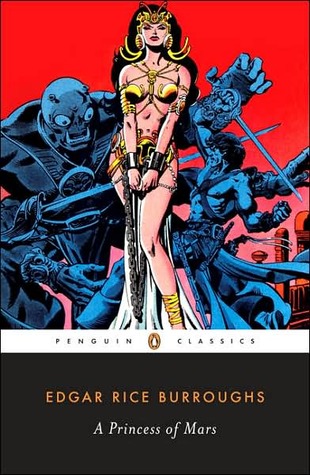 If I were younger, I would appreciate this book much better. It has lots of action, scantily clad woman, flying vehicle, sword and laser. What else would you expect? But, I grow up (old), and all these things has lost their magic.
If I were younger, I would appreciate this book much better. It has lots of action, scantily clad woman, flying vehicle, sword and laser. What else would you expect? But, I grow up (old), and all these things has lost their magic.
The story is simple. A (brutish) man John Carter, somehow magically transported to Mars. Somehow he has a superpower strength, thanks to the fortunate luck of being born on the surface of higher gravity planet Earth (Mars is about 1/3 of Earth’s gravity). Imagine Clark Kent, but from Earth to Mars. And on planet Mars, he finds a princess in distress, falls in love, and rescue her. Typical knight-in-shining-armor in a fairy tale.
Don’t expect any “science” in this science fiction. It is almost indistinguishable from fantasy books. All the technology is just there without any effort of explanation. What you have is green men on Mars (although not little and with six limbs), with weird plants and animals, without any effort to explain the evolution or ecosystem of Mars.
To defend this book, at least the author tried to make this novel astronomically accurate. There are description on the canals of Mars, the two Moon of Mars which are pretty accurate. The crisis faced by Martian is parallel with the observation from Earth that Mars is barren and the atmosphere is thin.
There is one little hint that the writer is mocking the communal living usually practiced by socialist group. The green men of Mars is depicted as the Spartan-like society, with little familial love. And the conclusion is simple, love conquers all. Simplistic, but maybe that’s all that we need.
The merit of this book is that it is being a classic. At least we know what science fiction looks like in the beginning of 20th century. But only that. Compared to the pinnacle of sci-fi, there are many better books that this one. The book does not offered much compared with any other pulp fiction books.
PS: The mode of travel from Earth to Mars is not explained. But if you are familiar with astral travel, it looks like that. So actually it is not John Carter’s physical body that travels to Mars, but his astral body. In other words, he is just dreaming.

 This is the weakest link in all this series that I have read, so far. If not by the merit of the ending, or the flow of the story as a whole, I would have give this book a TWO stars.
This is the weakest link in all this series that I have read, so far. If not by the merit of the ending, or the flow of the story as a whole, I would have give this book a TWO stars. I just reread of this novel, which I read about twenty years ago. Obviously, there are many new insight gained.
I just reread of this novel, which I read about twenty years ago. Obviously, there are many new insight gained.